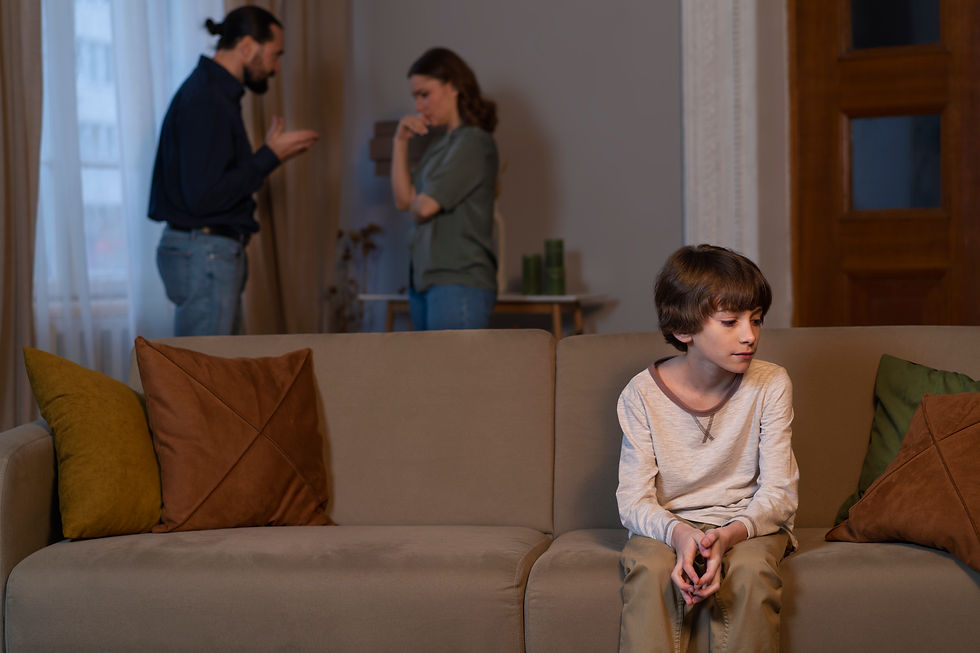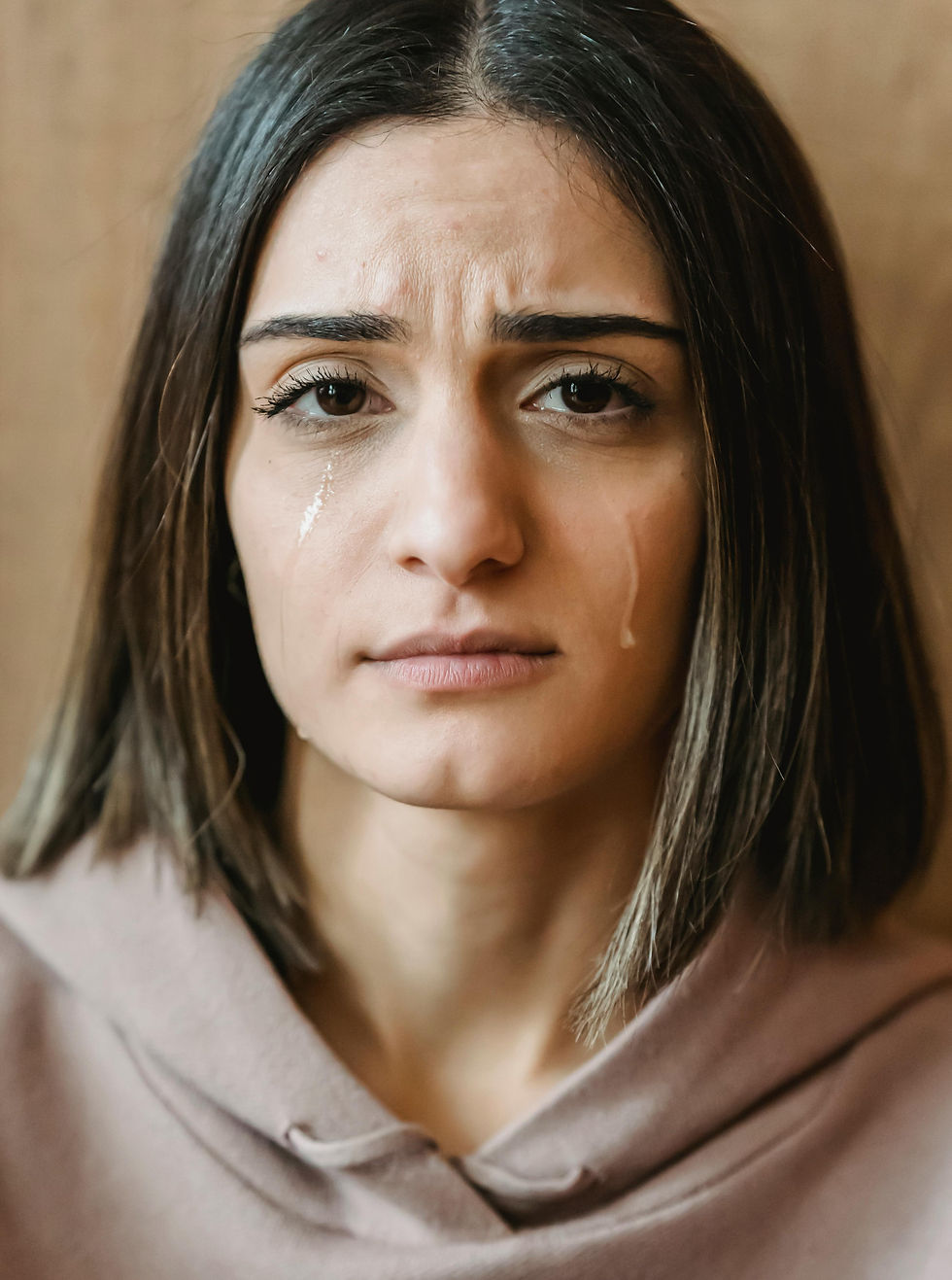“The Impact of Childhood Trauma on Adult Relationships”
- Lana Alencar

- Aug 25, 2025
- 4 min read
What keeps coming up in the therapy room – Part 2

“Oh wow… I guess I never really thought about how much my childhood is still living in me.” This is something I hear often as a therapist.
In my counselling office here in Winkler, one theme continues to surface across age, gender, and background: unresolved childhood trauma. And not just the big, obvious traumas we typically associate with the word—like abuse or tragic events. What keeps showing up is the quiet, often invisible pain of emotional neglect, chronic invalidation, or feeling unseen and unheard during crucial developmental years.
Clients sit across from me—successful, functional, loving people—and say things like:
“It wasn’t that bad. My parents did their best.”or “I know others had it worse, so I shouldn’t complain.”
But over time, a different truth often surfaces:
“I always feel like I have to prove I'm worthy of love.” “When my partner gets quiet, I spiral—just like I did when my mom used to shut me out.”
These are not complaints. These are clues. Clues that their nervous systems are still responding to wounds that haven’t had the chance to heal.
Part 1: Childhood Trauma Is More Than Just “Big T” Trauma
.
Trauma is not always about what happened. It’s also about what should have happened but didn’t. A parent’s tenderness, a consistent sense of safety, or having someone who could attune to your emotional world.
The small things add up:
A child who is frequently dismissed when crying
A parent who is physically present but emotionally unavailable
Repeated exposure to tension, criticism, or subtle shame
Always being “the responsible one” in a chaotic household
These early experiences can shape how a child sees themselves and others. Are my needs safe to express? Is love earned through performance? Am I allowed to make mistakes and still be loved?
Over time, these become internalized beliefs—and they follow us into adulthood.
As Dr. Bessel van der Kolk writes in The Body Keeps the Score:
“Being traumatized means continuing to organize your life as if the trauma were still going on—unchanged and immutable—as every new encounter or event is contaminated by the past.”
And because the trauma lives not just in memory, but in the nervous system, we may not even realize it’s affecting us.
Part 2: How Childhood Trauma Impacts Adult Relationships
Unresolved childhood trauma doesn’t fade with time. Instead, it often shows up in the most intimate parts of our lives—our marriages, our parenting, our self-worth.
You might notice it in:
Overreactions to small disagreements
Shutting down emotionally when feeling overwhelmed
Avoiding conflict to keep the peace—even when it’s at your own expense
Feeling constantly triggered in your romantic relationship
Fear of abandonment or rejection, leading to clinginess or emotional withdrawal.
Difficulty trusting, even when there's no clear reason not to.
Hypervigilance, always scanning for danger or betrayal.
Unconscious repetition, choosing partners who reflect unresolved childhood dynamics.
Trouble with boundaries, not knowing how to say no without guilt—or when to walk away.

Our partners may unintentionally awaken wounds that were never healed. The silence of a partner might echo a parent’s emotional unavailability. Criticism can feel like a replay of childhood shame. Arguments can activate old survival responses—fight, flight, freeze.
Parenting, in particular, can be a powerful mirror for unresolved trauma. Many people find that their own childhood wounds resurface when raising their children. A mother who was emotionally neglected may struggle to connect with her child. A father who was criticized harshly may repeat those same patterns—or swing to the opposite extreme and be overly permissive out of fear of repeating the past.
Acknowledging this can be both painful and freeing: painful because we realize how much we carry, but freeing because awareness is the first step to change.
“I never knew I still held so much anger until my child started throwing tantrums.” “I want to be patient, but I feel myself reacting just like my dad used to.”
This is not failure. It’s an invitation: to pause, notice, and begin again—with compassion for ourselves.
Part 3: Healing Trauma and Nurturing Healthy Relationships
Healing from childhood trauma is not about blaming parents, erasing the past or rehashing the past endlessly—it’s about learning to understand how early experiences shaped you, so that you can respond differently in the present.
If you recognize yourself in any part of this post, please know: you are not broken. You are responding in ways that made sense based on your early experiences.
Here are some ways to begin the healing journey:
✅ Learn to identify your triggers – Noticing what makes you feel overwhelmed or reactive is the first step in gaining control.
✅ Practice nervous system regulation – Deep breathing, grounding exercises, or walking in nature can help calm the fight-flight-freeze response.
✅ Build safe relationships – Healthy connections with safe people can be incredibly healing. We are wounded in relationship, and we heal in relationship.
✅ Seek professional support – Therapy is a safe space to explore what happened, how it’s affecting you now, and how to begin writing a new story. A trained counsellor can help you connect the dots between your past and your present patterns—and support you as you develop healthier tools for coping, relating, and loving.
“Being able to feel safe with other people is probably the single most important aspect of mental health.”– The Body Keeps the Score
If you are struggling with emotional triggers in your relationships or feeling overwhelmed as a parent, therapy can offer a place to process, heal, and grow.
You can stop surviving and start living.
Lana Marinho Bezerra Alencar, M. A. Counselling,
Associate Professional Counsellor in Winkler, Manitoba
Supporting women in identity, relationships, and personal growth
📍Counselling available in Winkler, MB and online throughout Manitoba
🖥️ Book a session or learn more: lanaalencar.com
**References**
- Van der Kolk, Bessel. *The Body Keeps the Score: Brain, Mind, and Body in the Healing of Trauma*. Penguin Books, 2014.
- Maté, Gabor. *The Myth of Normal: Trauma, Illness & Healing in a Toxic Culture*. Avery, 2022.
- Harvard Health Publishing. (2021). "Childhood trauma and its lifelong health effects."
- National Child Traumatic Stress Network. https://www.nctsn.org
.png)



Comments